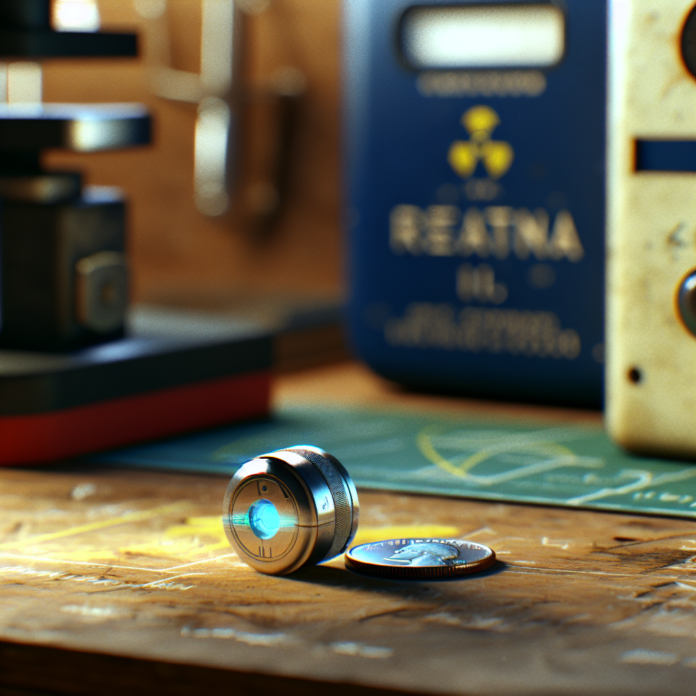Revolutionizing Energy Storage: Coin-Sized Nuclear Battery Promises 50-Year Lifespan
Introduction: A New Era in Power Solutions
Scientists and engineers have unveiled a groundbreaking advancement in the field of energy storage — a coin-sized nuclear battery that promises a remarkable 50-year lifespan. Developed by Chinese startup Beijing Betavolt New Energy Technology, this compact power source has the potential to transform how we think about long-term energy solutions across multiple industries including consumer electronics, aerospace, and medical devices. In this article, we explore the science behind this innovation, its potential applications, and what it means for the future of portable power.
What Is a Nuclear Battery?
Nuclear batteries—also known as betavoltaic batteries—are energy sources that generate electricity through the decay of radioactive isotopes. Unlike traditional batteries that rely on chemical reactions, these batteries use the kinetic energy from emitted beta particles (electrons) to produce a consistent and long-lasting electric current.
Betavolt’s coin-sized battery relies on isotope nickel-63 as its power source. When nickel-63 decays, it emits low-energy beta particles. These particles are then converted into electricity by a semiconductor chip in a process that’s entirely safe and radiation-free outside the device.
Features of the Betavolt Nuclear Battery
Compact and Lightweight Design
Roughly the size of a coin, the Betavolt battery is designed to power small electronic devices while maintaining a lightweight and compact form. This makes it ideal for use in environments where space and weight are at a premium, such as satellites or medical implants.
Unprecedented Lifespan
The standout feature is its lifespan. This miniature nuclear battery can operate continuously for up to 50 years without requiring replacement or maintenance. This longevity is a game-changer in sectors where battery replacement is either logistically challenging or prohibitively expensive.
Environmental Safety
Despite involving radioactive material, the Betavolt battery is claimed to be entirely safe. The beta particles emitted during decay are low-energy and do not penetrate human skin, rendering the battery harmless. Moreover, once depleted, the radioactive material transforms into a stable, non-radioactive element, mitigating environmental concerns.
Wide Temperature Tolerance
This innovative battery can operate efficiently in extreme temperatures, ranging from -60°C to 120°C. Such temperature resilience makes it suitable for use in harsh environments like outer space, deep-sea explorations, or arctic installations.
Potential Applications
Medical Devices
Medical implants such as pacemakers and neurostimulators could immensely benefit from a battery that requires no maintenance or replacement for five decades. This could significantly reduce the number of invasive procedures required for battery changes and improve patient quality of life.
Aerospace and Defense
Space missions and military applications demand power solutions that are reliable and long-lasting. These nuclear batteries are ideal for powering deep-space probes, surveillance equipment, and unmanned vehicles running in isolated or hard-to-access environments. In space, where solar energy is unreliable or unavailable, nuclear batteries like Betavolt’s offer a practical alternative.
Small Electronics and IoT Devices
The Internet of Things (IoT) ecosystem includes millions of sensors and devices that could benefit from battery-free operation for decades. Devices embedded in infrastructure, agriculture, or remote regions could continue functioning seamlessly with Betavolt’s nuclear technology, saving billions in maintenance costs.
Underwater Equipment
Submersibles and underwater sensors often operate in extreme conditions where changing batteries is impractical. A battery with a 50-year lifespan would be a perfect fit, ensuring consistent energy supply in submerged environments.
Advantages Over Traditional Batteries
Compared to lithium-ion and other traditional battery technologies, Betavolt’s nuclear battery offers several advantages:
- Longevity: Operates continuously for 50 years without maintenance.
- Durability: Performs effectively in extreme environmental conditions.
- Compactness: Coin-sized design suitable for miniature devices.
- Safety: Low-energy beta emissions with no risk of radiation exposure.
- Eco-friendliness: Leaves no hazardous waste post usage.
Challenges and Limitations
While promising, the deployment of nuclear batteries at a large scale is not without its challenges:
- Regulatory Hurdles: The use of radioactive materials necessitates strict regulation, which could delay commercial rollout in many countries.
- Production Costs: Manufacturing isotope-based batteries is currently expensive, although mass production could reduce costs over time.
- Public Perception: Despite being safe, public wariness about nuclear materials may hinder early adoption.
Global Implications and Market Disruption
The emergence of nuclear batteries like Betavolt’s could significantly disrupt the energy storage market. If scaled efficiently, such batteries could replace millions of traditional batteries, reduce e-waste, and lessen dependence on rare-earth elements. Industries may start designing hardware optimized for decades-long lifespans, pushing the boundaries of product engineering and reliability.
Moreover, the environmental footprint of battery manufacturing could drastically shrink, as fewer replacements and resources will be needed over time. This shift toward ultra-long-life energy could align with global sustainability goals and carbon reduction strategies.
What Lies Ahead
Beijing Betavolt has announced plans to scale up production and further miniaturize its components. The company believes that future iterations might even generate power outputs capable of operating smartphones and drones. While commercial rollout timelines are yet to be defined, prototypes are being tested for adoption in strategic industries.
The tech community is watching closely as this innovation matures. Should Betavolt deliver on its promises and overcome regulatory and production challenges, we may soon witness a transformative shift in how energy is stored and consumed on a global scale.
Conclusion
Betavolt’s coin-sized nuclear battery represents a revolutionary step in energy technology. With its miniature form factor, extreme lifespan, and safety assurances, it has the potential to redefine the standards of power solutions in both commercial and industrial sectors. While challenges remain, the potential upside is enormous. As society continues to demand more sustainable, reliable, and long-lasting energy sources, innovations like this could very well be the future of electricity on Earth—and beyond.


